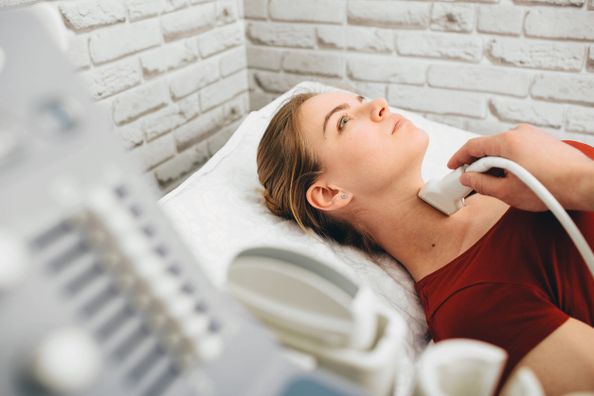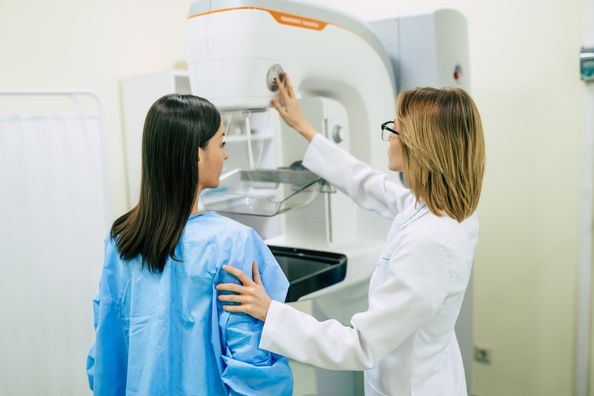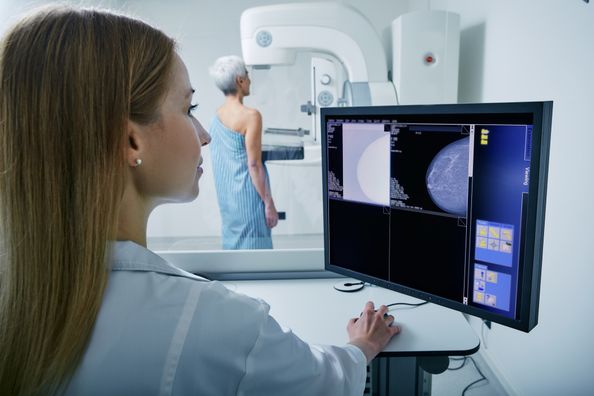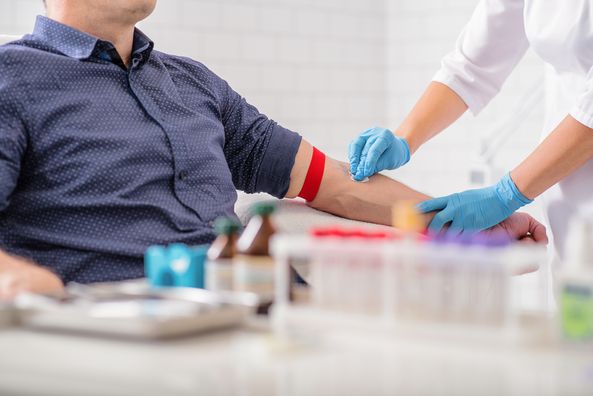The American Thyroid Association reports that while thyroid lumps (nodules) are common, fewer than 1 in 10 is cancerous. If a physician feels a lump in your neck/thyroid, a fine needle aspiration may be recommended to diagnose if it is cancer.
What is the Thyroid Gland?
The thyroid gland is a butterfly-shaped endocrine gland that is normally located in the lower front of the neck. The thyroid’s job is to make thyroid hormones, which are secreted into the blood and carried to every tissue in the body. Thyroid hormones help the body use energy, stay warm and keep the brain, heart, muscles, and other organs, working as they should.
What Is A Fine Needle Aspiration (FNA) Biopsy of a Thyroid Nodule?
A fine needle aspiration (FNA) biopsy of a thyroid nodule is a simple and safe procedure performed in an outpatient setting. The biopsy is guided by ultrasound to ensure accurate placement of the needle within the thyroid nodule (or nodules if you have more than one). A FNA is usually done to identify the type of cells inside a lump or to evaluate how well treatment of an existing lump is working. Fine needle aspirations are a safer and less traumatic alternative to biopsies which require surgery.
How Can I Prepare for my FNA?
Most medications can be continued when having a FNA. However, often, but not always, anticoagulants, also called “blood thinners”, are stopped temporarily in anticipation of your thyroid biopsy. Blood thinner medications can increase the risk of bleeding or bruising. It is common to receive specific instructions regarding when to stop taking medications prior to the procedure. If you have any questions about taking your medications before the thyroid biopsy, be sure to talk to your doctor.
How is the Procedure Performed?
You will be asked to lie down on your back with your head tipped upward, so that your neck is extended. Sometimes, a towel is placed under your neck to help you get in best position for the biopsy.
During the thyroid biopsy, gel will be applied to your neck to obtain ultrasound images and locate the nodule(s). This gel is water soluble and non-toxic, but may get on clothing or jewelry. You will be asked to change into a gown to prevent any ultrasound gel or antisepetic solution from getting on your clothes.
Your neck will first be cleaned with an antiseptic solution. A local anesthetic called lidocaine will be given to numb the area. During the procedure you may feel some neck pressure from the ultrasound probe and from the needle. You will be asked to remain as still as possible and do your best to avoid coughing, talking and swallowing during the biopsy.
For the biopsy, the practitioner will insert a very thin needle through the skin and into the thyroid nodule. After the sampling, which only takes several seconds, the needle will be removed. New needles are used for any additional samples. Several samples of cells will be obtained, by sticking a fine needle in various parts of the nodule to collect cells. This assures a better chance to find cancerous cells if they are present. If there is fluid in the nodule, a syringe may be used to drain it.
Once the biopsy is completed, pressure will be applied to the neck. The procedure usually lasts less than 30 minutes.
After Your Fine Needle Aspiration
Home Care After Fine Needle Aspiration
- You will have a small adhesive bandage on your procedure site. This bandage should be left in place for four to six hours. After this time, you will not need to keep it covered.
- It is common to have some pain, swelling and even a little bruising where the needle was inserted into your neck. Simple over-the-counter pain medication such as Tylenol (acetaminophen) can be taken for this. Pain and swelling should be minimal after 48 hours.
- You can shower the day after your biopsy, however you should refrain from bathing or swimming for at least three days following your procedure.
- It is important to avoid strenuous activity for 24 hours following your procedure, particularly activity that involves bending over, straining (like lifting weights) or working over your head (like hanging pictures), as all of these activities can increase the chance of internal bleeding into the thyroid gland.
When to Call Your Physician
- It is uncommon to have increasing pain, redness, tenderness, drainage at the procedure site, or a fever of 100.4 F or higher. If you experience any of these symptoms, contact your physician.
- It is uncommon to have any change in your voice, severe pain, general neck swelling, or difficulty breathing or swallowing after a thyroid FNA. If any of these things happen, contact your physician.
- If you are experiencing difficulty breathing after the procedure, you should go immediately to the nearest emergency department.
Getting Your Results
- Most patients receive their results within two weeks following their procedure.
- Your doctor will contact you with the results once they have reviewed them.
Health Topics:







